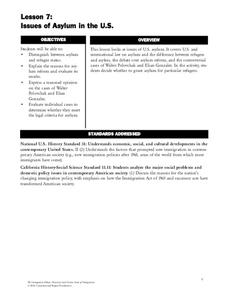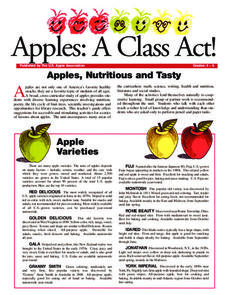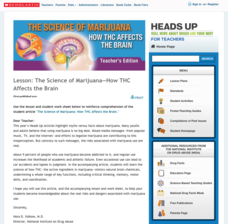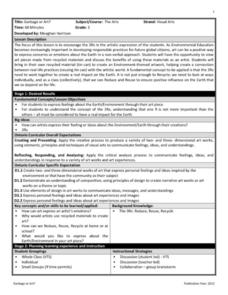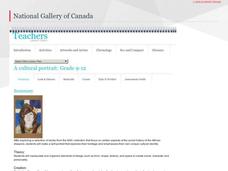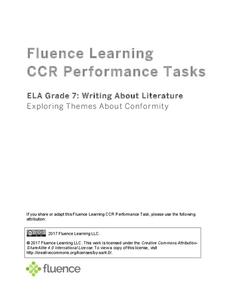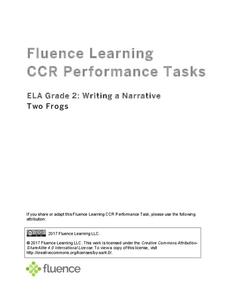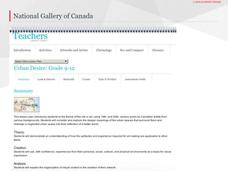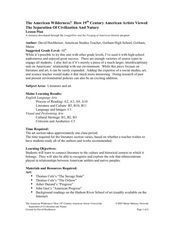Constitutional Rights Foundation
Issues of Asylum in the U.S.
Who gets to come to the United States? Examine cases of individuals seeking asylum with an informative reading passage that includes examples, statistics, and representations of public opinion regarding asylum. Groups then go on to...
New York City Department of Education
Grade 11 Literacy in Social Studies: Research Paper
The lesson guides young academics through the steps in producing a 10-page research paper on any topic in American history. Historians begin by formulating a thesis and gathering resources, then move on to creating an outline, and end...
Mary Pope Osborne, Classroom Adventures Program
Mummies in the Morning Egyptian pyramids, hieroglyphics
Visit the Magic Treehouse and take your class on a trip through time with a reading of the children's book Mummies in the Morning. Using the story to spark an investigation into Egyptian culture, this literature unit engages...
US Apple Association
Apples: A Class Act! (Grades 4–6)
Middle schoolers have a bushel of fun as they engage in activities and research core facts about apples. Packed with suggestions for in-class activities and out-of-class research, the colorful 6-page packet is sure to satisfy hungry...
Sea World
Endangered Species
Study different endangered species with several activities that incorporate math, science, language arts, and research strategies. A great addition to your lesson on conservation or Earth Day.
Scholastic
The Science of Marijuana—How THC Affects the Brain
Marijuana can affect every part of a user's life—starting with the delicate nervous centers of the brain. An informative article and worksheet prompt teenagers to learn more about how the THC found in most forms of marijuana can...
Curated OER
Student Opinion: Are You Popular, Quirky or Conformist?
Approach the topic of popularity with this resource from the New York Times and their Learning Network series. The article is about Alexandra Robbins' "Quirk Theory." Learners respond to the article excerpt either on paper or online....
Curated OER
Drawing with Thread
After a study of work by Wassily Kandinski, have your aspiring artists recreate "Drawing with Yarn." It was one of his works made in 1913 that demonstrates his abstract style. What a beautiful work of art to make with your class!
Curated OER
Garbage or Art?
The three R's are, reduce, reuse, and recycle. Third graders use recycled materials to design and create an environmentally themed piece of art. They discuss and examine major art works that were created using recycled materials, then...
Mascil Project
Pottery
Don't cry over broken pottery. A cross-curricular lesson challenges pupils to consider how to restore ancient pottery. Using a computer program and their knowledge of transformations, they come up with a way to recreate the original...
Curated OER
Politics and Religion in 17th Century Dutch Art
Seventh graders examine different pieces of Dutch Art. They identify its social and political meanings by using cultural and historical information. They examine maps of the time period as well.
Museum of Tolerance
Cultural Research Activity
Class members explore cultural diversity through a variety of texts that showcase the importance of traditions. Then, they interview their family members to research their own cultural background and write their findings on quilt pieces....
National Gallery of Canada
A Cultural Portrait
Explore heritage and identity through an examination of art and a related project. The featured art, related to the African diaspora, includes several types of art created by different artists. Pupils consider their own backgrounds and...
Fluence Learning
Writing About Literature: Exploring Themes About Conformity
Feeling the pressure to confirm is something any adolescent can relate to. Explore an essential theme with a response to literature assessment that prompts learners to identify main ideas with evidence and supporting details.
Fluence Learning
Writing a Narrative: Two Frogs
Three options offer young writers the opportunity to read a short story, answer questions, and write a response. A handy language arts resource focuses on reading comprehension and analyziing the story's lesson: look before you leap.
National Gallery of Canada
Urban Desire
Urban spaces are often overlooked and broken down. Offer your pupils the opportunity to reimagine an urban space. Learners examine and discuss works of art related to this theme and consider their own communities. Small groups then...
K12 Reader
What is a Tribal Government?
What is life like on a Native American reservation? Learn about the ways a tribal government works with a reading comprehension activity. After reading a short passage, kids use context clues to answer five comprehension questions.
Curated OER
Fracking: Positive or Negative Impact?
Your teenagers may have heard of fracking, but do they really know what it is? And could they debate the benefits and risks? Educate your environmental science class with a lesson about hydraulic fracturing, non-renewable energy sources,...
Missouri Department of Elementary
My Feelings
Encourage self-awareness with a lesson that challenges scholars to identify feelings—happy, sad, mad, and scared. Using a feelings thermometer, similar to that of a bar graph, pupils discuss how they would feel in specific scenarios then...
Curated OER
The American Wilderness? How 19th Century American Artists Viewed the Separation of Civilization and Nature
The attitudes of European settlers toward the American wilderness, as reflected in art and literature, is the focus of this resource packet designed for teachers. Included in the unit overview you will find lists or paintings and works...
American Forest Foundation
Who Speaks for the Trees?
Help young conservationists appreciate the important role that trees play in ecosystems around the world with this collection of six engaging activities. From a shared reading and class discussion of Dr. Seuss' The Lorax, to in an depth...
California Academy of Science
A Day in the Life of a San Francisco Native Animal
Before Google, before Sillicon Valley, before the Gold Rush, the San Francisco landscape was a biome filled with grizzly bears, mule deer, tule elk, coyotes, gray fox, gophers, and moles. To explore the early days of yesteryear, kids...
K12 Reader
Self Reflection
Instill the positive study habit of reflecting on learning by reading this passage with your class. The passage describes how reflection can be a powerful learning tool, and how learners can start reflecting. After reading, class members...
Manitoba Education and Early Childhood Learning
A Foundation for Implementation
Color is the focus of this amazing resource packed with math, social studies, science, and language arts activities. Kids create a color word wall and post symbols, graph the number of objects they find of each color while on a treasure...


